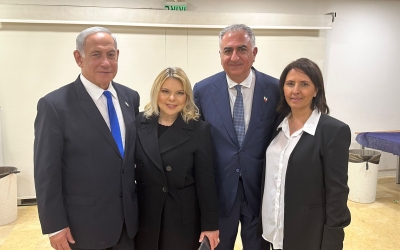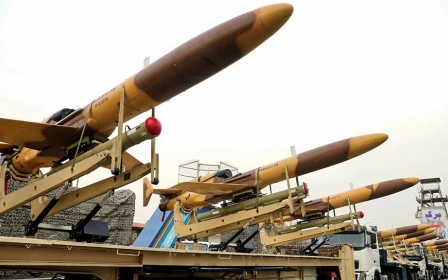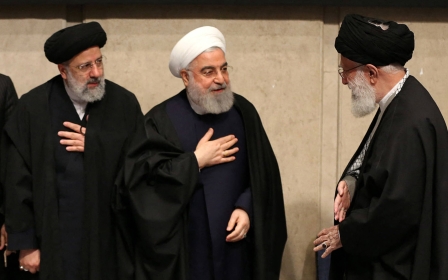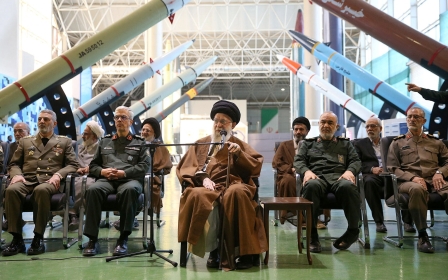War on Gaza: How pro-Israel Iranian Americans are silencing Palestine supporters
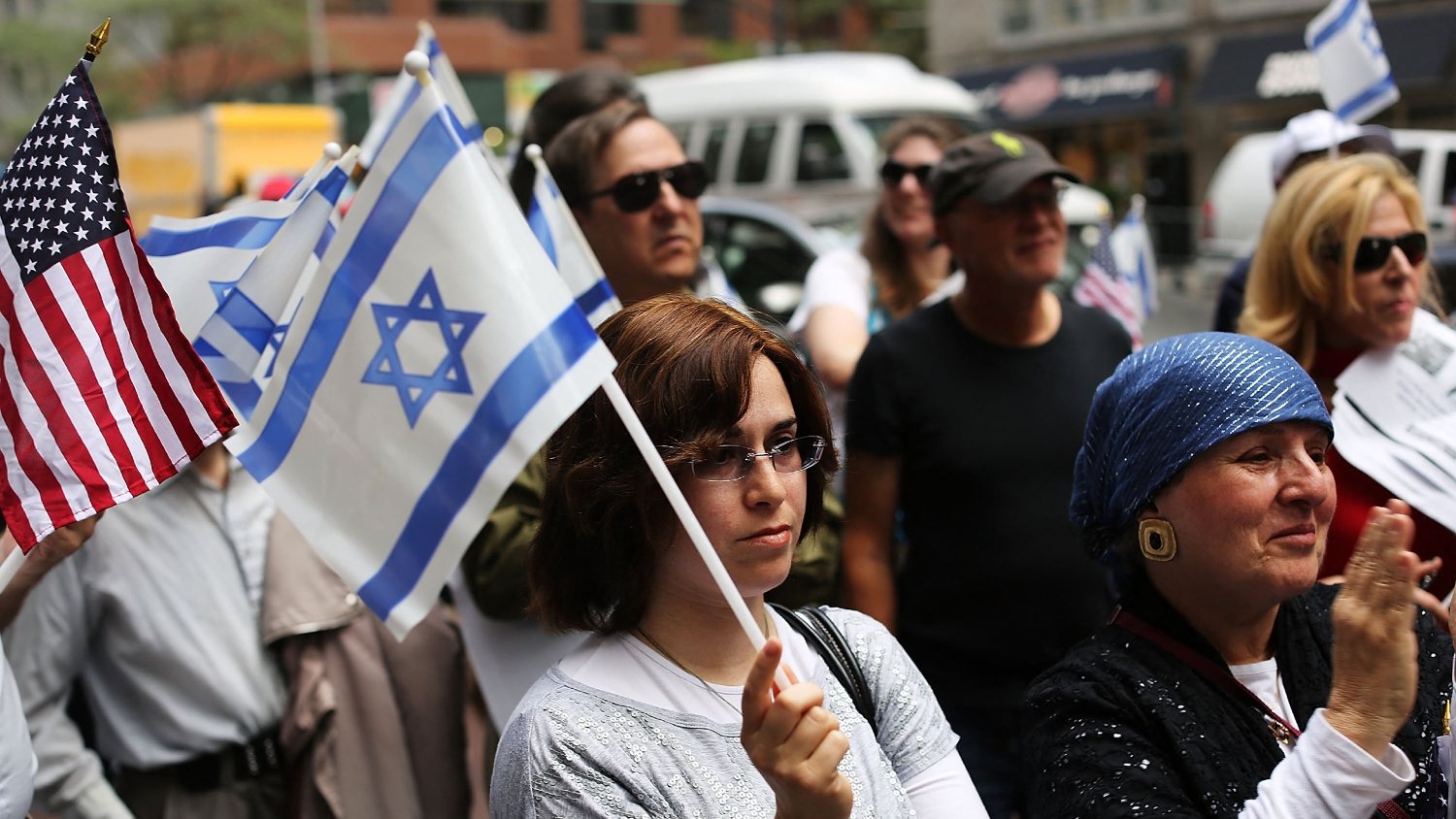
Roughly a year ago, the US's Iranian diaspora was united in mass protests when 22-year-old Mahsa Amini died in police custody after Iran's morality police arrested her for "improperly" wearing her hijab, causing one of the most prominent and sustained opposition movements against the Iranian government since the 1979 Islamic revolution.
One year later, the diaspora is in a bitter divide. This time the issue at hand is Israel's war on Gaza.
Since 7 October, Iranian Americans have come out onto the streets of US cities waving Israeli flags and calling for Hamas to be eliminated.
The fervent support for Israel among some members of the Iranian-American community has been in place for decades. However, the past several months have seen an intense uptick in this support from a small minority seeking to push out any pro-Palestine sentiments.
Several Iranian-American activists who spoke to Middle East Eye on condition of anonymity have said they fear speaking out in support of Palestine, saying that anyone who does so publicly has been faced with doxxing campaigns and even threats to their lives.
"It's one of those things where it's caused a huge divide in the community," said one Iranian activist who spoke to Middle East Eye on condition of anonymity, for fear of being attacked by pro-Israel Iranians.
"And I think the root of it is hating the Iranian government so much - justifiably so - that anything they support you just automatically hate without understanding that it's not black and white."
The Iranian activist had grown close to many other activists and content creators in the diaspora when she began to speak out in support of the mass protests in Iran over the killing of Amini.
"So prior to the October 7 attack, there was a sense of community within the Iranian content creators and the Iranian activists. We were all working towards one goal which was the liberation of the women of Iran," they said.
'How dare you'
One Iranian activist said that they had always known that there were segments of the Iranian community that espoused Zionist ideology but did not become fully aware of how prevalent it was until after the 7 October Hamas-led attacks against Israel, which killed 1,200 Israelis and other nationalities.
Israel responded by declaring war on Gaza and launched a devastating bombing campaign followed by a ground invasion of the enclave that has so far killed more than 21,000 Palestinians, the majority of them being women and children.
When the Iranian activist began to post pro-Palestinian content critical of Israel's war in Gaza, she said many Iranians began to unfollow her and then accused her of supporting terrorism.
When launching the 7 October attack, Hamas called on its allies in the Axis of Resistance, an Iran-led, anti-Israel coalition of states and armed groups, to aid the Palestinian movement in its fight against Israel.
While Iran has voiced support for the attack on Israel, Tehran has maintained distance by saying it had no forewarning of Hamas’s attack. It has insisted that its allies act of their own accord, and has not made any direct interventions itself.
"It then kind of turned into this like 'how dare you want the freedom of Iranian women, but support the Gaza Strip which is governed by the Hamas militia'," the activist said.
"I look at different things that are happening across the world, and when I see an injustice, I speak to it. My priority is not who funds Hamas, my priority is what the people in Gaza and the occupied West Bank are going through."
Pahlavi, Iran, and Israel
Iranian-Israeli ties date back to the days of Shah Mohammad Reza Pahlavi, but a lot of the ties between those who oppose the current Iranian government and Israel can date back to the 1979 Islamic Revolution.
Shortly after the revolution, which saw the overthrow of Pahlavi, there was a mass exodus of Iranian Jews to Israel. The population in Iran dropped from 100,000 to about 20,000, for reasons largely attributed to persecution and financial hardships.
Since the revolution, Israel and Iran have become rancorous enemies, and while they have not engaged in direct wars, the two countries have battled each other in the fields of intelligence and espionage.
'Israel strategically aligns with persecuted minorities in Iran'
- Iranian activist
Israel has also tried to infiltrate and take advantage of genuine issues within Iran, such as the grassroots Amini protests or the plight of minority groups in the country.
"Israel strategically aligns with persecuted minorities in Iran, offering temporary support with selfish intentions. It's a delicate balance," said another Iranian activist who also spoke to MEE on condition of anonymity.
Given the bitter rivalry between Israel and Iran post-1979, many members of the Iranian diaspora who fled the country in opposition to the new government found themselves in favour of Israel because it shared a similar anti-Iranian government sentiment.
Another huge moment that helped garner support for Israel amongst the pro-Shah Iranian diaspora was when Reza Pahlavi, the son of the deposed king, made a historic visit to Israel in April 2023.
"Prior to October 7th, Reza Pahlavi went to Israel and met with Netanyahu. This shifted many Iranians in the diaspora. Some who had previously held a sentiment for a free Palestine started having pro-Israel views," one Iranian activist told MEE.
"The prominence of Iranian Zionists on social media and Reza Pahlavi's pre-October 7 coalition-building efforts amplified the Zionist influence. It's important to recognise this as a minority of Iranians, rather than a majority."
A loud minority
The pro-Israel segments of the Iranian-American community include prominent activists such as Masih Alinejad, who said in 2021 that she would “love to visit Israel”. Since the 7 October attacks, she has called on Washington to designate the Iranian Revolutionary Guard as a terror group for Tehran’s support of Hamas.
However, several activists who spoke to Middle East Eye said that these individuals are just a small minority of the larger Iranian-American community.
'The Iranian Zionists who are online are a small and very loud minority'
- Iranian activist
They say the reason that it appears that most Iranians in the diaspora are pro-Israel is because most of the ones who do support Palestine are afraid to speak up.
"The vocal presence of Iranian Zionists online and at rallies might create a misleading perception. In reality, many Iranians are afraid to speak out and do not align with this viewpoint," said one Iranian activist who spoke to MEE on condition of anonymity.
"The loudness on social media doesn't accurately represent the broader sentiment."
One video posted online by a content creator criticised Iranian Zionists for spreading propaganda in support of Israel, and led to a campaign of people calling her workplace to accuse her family of being members of Hamas, which is a designated terrorist group in the US.
In another situation, an activist on social media speaking in support of Palestine was subject to doxxing campaigns, including calling on police to investigate their accounts.
"The Iranian Zionists who are online are a small and very loud minority, because I do know a lot of people in our community who are pro-Palestine. They're just too scared to speak," said the other activist.
Middle East Eye propose une couverture et une analyse indépendantes et incomparables du Moyen-Orient, de l’Afrique du Nord et d’autres régions du monde. Pour en savoir plus sur la reprise de ce contenu et les frais qui s’appliquent, veuillez remplir ce formulaire [en anglais]. Pour en savoir plus sur MEE, cliquez ici [en anglais].


